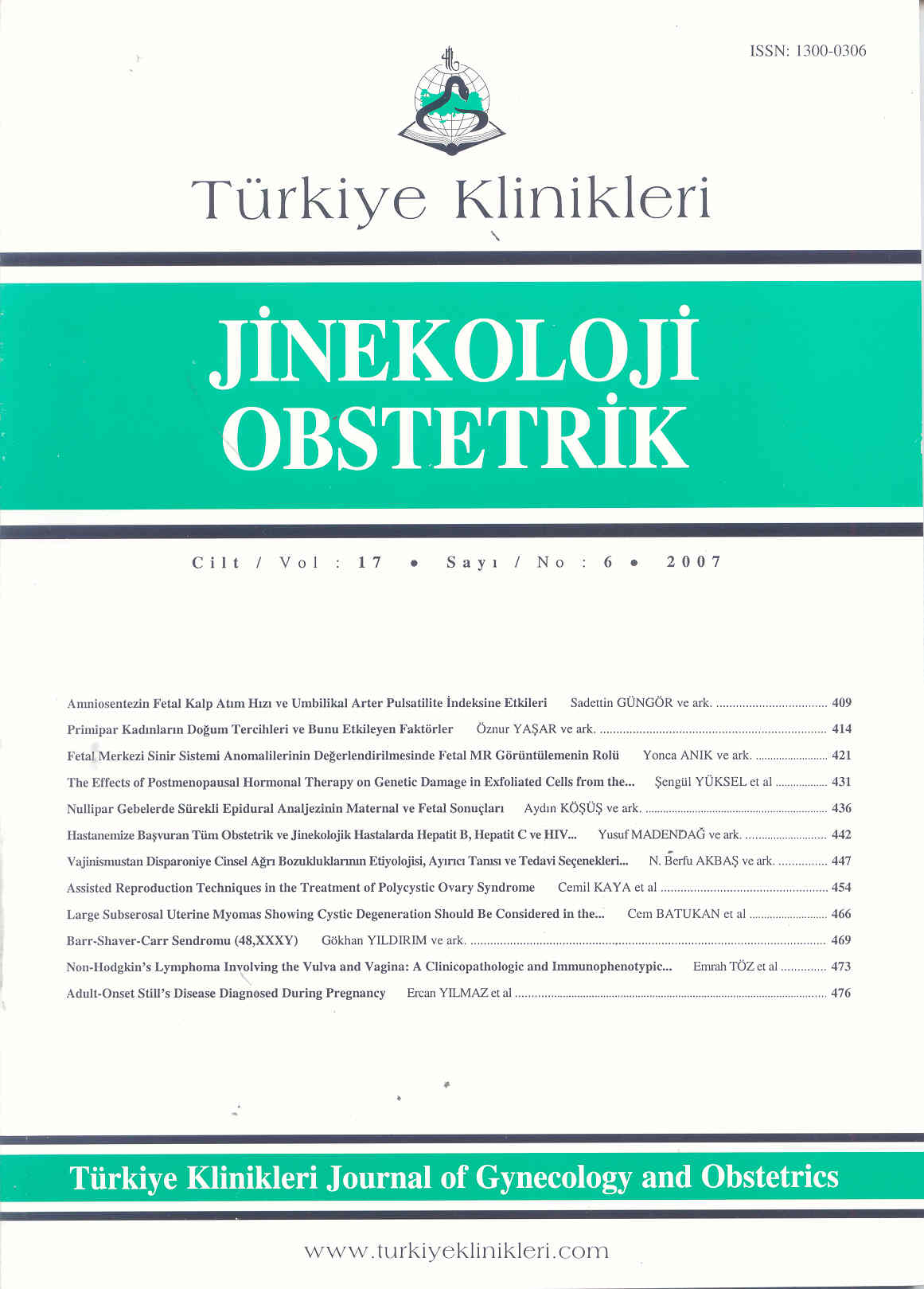Open Access
Peer Reviewed
ORIGINAL RESEARCH
1895 Viewed1013 Downloaded
The Effects of Postmenopausal Hormonal Therapy on Genetic Damage in Exfoliated Cells from the Uterine Cervix
Postmenopozal Hormonal Terapinin Uterin Serviks Yüzey Hücrelerinde Genetik Hasar Üzerine Etkileri
Turkiye Klinikleri J Gynecol Obst. 2007;17(6):431-5
Article Language: EN
Copyright Ⓒ 2025 by Türkiye Klinikleri. This is an open access article under the CC BY-NC-ND license (http://creativecommons.org/licenses/by-nc-nd/4.0/)
ABSTRACT
Objective: Although postmenopausal hormonal therapy (PHT) may offer considerable benefits for menopausal women, estrogen administration is accepted as a risk factor of human cancers. The aim of this study was to evaluate the possible genotoxic effects of long-term administration of postmenopausal hormonal therapy (PHT) drugs in postmenopausal women by used micronucleus (MN) analysis, a DNA mutation screening test, which is more rapid, economic and sensitive technique. Material and Methods: A total of 40 postmenopausal women were included in the study: 20 were taking PHT, and a further 20 were nonuser as a control group. Participants in the study group have been using conjugated equine estrogen 0.625 mg/day+ medroxyprogestrone acetate 2.5 mg/ day for 6 months. All women had gynecological examination, at which time cervico-vaginal smears were obtained with an Ayre spatula. The cervical smear slides were scored blind and MN frequency was evaluated as number of micronuclei per 1000 binucleated cells. Results: Although the evaluation of micronuclei number in cells showed genomic instability in somatic cells, in our study, analysis of the MN data revealed homogeneity among women within each of the two groups (P>0.05). Conclusion: This may be interpreted as PHT does not cause any microarchitechtural change leading to a malignancy of the cervix. Future studies may validate this finding among larger groups of patients and also with other PHT agents.
Objective: Although postmenopausal hormonal therapy (PHT) may offer considerable benefits for menopausal women, estrogen administration is accepted as a risk factor of human cancers. The aim of this study was to evaluate the possible genotoxic effects of long-term administration of postmenopausal hormonal therapy (PHT) drugs in postmenopausal women by used micronucleus (MN) analysis, a DNA mutation screening test, which is more rapid, economic and sensitive technique. Material and Methods: A total of 40 postmenopausal women were included in the study: 20 were taking PHT, and a further 20 were nonuser as a control group. Participants in the study group have been using conjugated equine estrogen 0.625 mg/day+ medroxyprogestrone acetate 2.5 mg/ day for 6 months. All women had gynecological examination, at which time cervico-vaginal smears were obtained with an Ayre spatula. The cervical smear slides were scored blind and MN frequency was evaluated as number of micronuclei per 1000 binucleated cells. Results: Although the evaluation of micronuclei number in cells showed genomic instability in somatic cells, in our study, analysis of the MN data revealed homogeneity among women within each of the two groups (P>0.05). Conclusion: This may be interpreted as PHT does not cause any microarchitechtural change leading to a malignancy of the cervix. Future studies may validate this finding among larger groups of patients and also with other PHT agents.
ÖZET
Amaç: Postmenopozal hormonal terapinin (PHT) menopozlu kadınlar için oldukça faydalı olduğu düşünülmesine rağmen, östrojen alımının insan kanserlerinde bir risk faktörü olduğu kabul edilmektedir. Bu çalışmanın amacı, menopozal kadınlarda uzun süreli PHT ilaçlarının kullanılmasının olası genotoksik etkilerini, hızlı, ekonomik ve duyarlı bir DNA mutasyon tarama yöntemi olan mikronükleus (MN) testi ile araştırmaktır. Gereç ve Yöntemler: Toplam 40 postmenapozal kadın çalışmaya dahil edildi (20 PHT alan ve 20 kontrol). Uygulama grubundakiler 6 ay süreyle konjuge equine estrojen 0.625 mg/gün+ medroksiprogestron asetat 2.5 mg/ gün kullandı. Tüm kadınlara jinekolojik muayene yapıldı, aynı zamanda Ayre spatula ile serviko-vajinal smearlar alındı. Servikal smear preparatları körleme skorlandı ve MN frekansı 1000 binüklear hücrede mikro-nükleus sayısı olarak değerlendirildi Bulgular: Hücrelerde MN sayısının saptanması somatik hücrelerde genomik kararsızlığın göstergesi olsa da, bizim çalışmamızda MN verilerinin analizi her iki gruptaki kadınlar arasında benzer bulundu (P>0.05). Sonuç: Bu durum, PHT'nin serviksin kanserleşmesine neden ola-bilecek herhangi bir mikroyapısal değişikliğe yol açmadığı şeklinde yorumlanabilir. Sonraki çalışmalar daha geniş hasta grubu ve diğer PHT ajanları kullanılarak bu verileri doğrulayabilir.
Amaç: Postmenopozal hormonal terapinin (PHT) menopozlu kadınlar için oldukça faydalı olduğu düşünülmesine rağmen, östrojen alımının insan kanserlerinde bir risk faktörü olduğu kabul edilmektedir. Bu çalışmanın amacı, menopozal kadınlarda uzun süreli PHT ilaçlarının kullanılmasının olası genotoksik etkilerini, hızlı, ekonomik ve duyarlı bir DNA mutasyon tarama yöntemi olan mikronükleus (MN) testi ile araştırmaktır. Gereç ve Yöntemler: Toplam 40 postmenapozal kadın çalışmaya dahil edildi (20 PHT alan ve 20 kontrol). Uygulama grubundakiler 6 ay süreyle konjuge equine estrojen 0.625 mg/gün+ medroksiprogestron asetat 2.5 mg/ gün kullandı. Tüm kadınlara jinekolojik muayene yapıldı, aynı zamanda Ayre spatula ile serviko-vajinal smearlar alındı. Servikal smear preparatları körleme skorlandı ve MN frekansı 1000 binüklear hücrede mikro-nükleus sayısı olarak değerlendirildi Bulgular: Hücrelerde MN sayısının saptanması somatik hücrelerde genomik kararsızlığın göstergesi olsa da, bizim çalışmamızda MN verilerinin analizi her iki gruptaki kadınlar arasında benzer bulundu (P>0.05). Sonuç: Bu durum, PHT'nin serviksin kanserleşmesine neden ola-bilecek herhangi bir mikroyapısal değişikliğe yol açmadığı şeklinde yorumlanabilir. Sonraki çalışmalar daha geniş hasta grubu ve diğer PHT ajanları kullanılarak bu verileri doğrulayabilir.
MENU
POPULAR ARTICLES
MOST DOWNLOADED ARTICLES





This journal is licensed under a Creative Commons Attribution-NonCommercial-NoDerivatives 4.0 International License.










